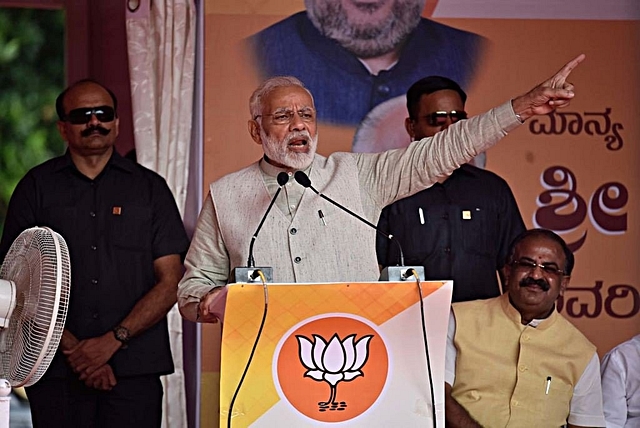
Modi’s Kannada-Tulu Efforts Make For Good Optics, But He Should Water The Roots Of Multi-Lingualism
It is time we began watering the soil in which our languages can grow again.
Narendra Modi would leave a rich legacy if he starts creating a fund for enriching and rejuvenating all Indian languages.
Prime Minister Narendra Modi’s efforts to begin some of his speeches in Kannada and Tulu while campaigning for his party in the state assembly elections make for good optics. It will go some way to blunt the claim of Karnataka Chief Minister Siddaramaiah that the Bharatiya Janata Party (BJP) is a north Indian party trying to shove Hindi down unwilling Kannadiga throats.
But a party that hopes to make Karnataka its gateway to the south ought to do more than just indulge in symbolism. In fact, it would do the BJP a world of good if it engages with a deeper form of nationalism where all languages – regional and sub-regional – are given respect and financial resources to grow.
There is a simple way to start the process, and it will have the additional advantage of generating thousands of jobs for people conversant in two or three Indian languages: he should create a fund for translating the best literary and non-literary works written in any Indian language to other Indian languages, and from English to all Indian languages. The last will ensure that the best the world has to offer is available to Indians in their mother tongues.
If Premchand can be read in Assamese, and Kamba Ramayan in Bhojpuri, consider the lift national integration will get compared to mere slogans of Bharat mata ki jai.
A Rs 1,000 crore initial corpus, to be supplemented by equal amounts made available by state governments, will be a good start. The initial focus of the fund should be to enable regional-to-regional language translations, and the subsequent focus could bring the best of English writing to regional languages, including Hindi. At some point, the same should be done with work written in German, Chinese, French, et al.
This initiative ought to be followed up by emphasising mother tongue as the language of instruction upto Class IV, after which one can switch to bilingualism, with mother tongue and English being used interchangeably, as required.
It is worth noting a simple counter-intuitive truth: languages don’t evolve in isolation; they co-evolve with sister languages. It is easy, given the foolishness of India’s Hindu chauvinists, to pit Kannada against Hindi or Marathi against Gujarati (as was the case when the Shiv Sena rose to power in Mumbai), but the reality is that Indian languages will rise and fall together. To promote Hindi, you need to promote Tamil as well, so that both languages draw from the genius of the other.
The problem with regional resistance to Hindi is that it is self-defeating. To counter Hindu imposition, we end up valorising English, which, in the end swallows up all Indian languages. This is no different from the rivalry of Jaichand and Prithviraj. They may have had their local games of one-upmanship, but when faced with the challenge of Ghurid invasions, they ought to have banded together rather than made common cause with the enemy. This is what we are doing when we privilege English over Indian languages.
That still leaves us with another problem: whether we like it or not, Hindi will still dominate since it is the largest spoken language in India. And Hindi imposition is not merely something the Centre is forcing on us; Bollywood does this more subtly. A simple, yet subtle, way to make Hindi less of a Frankenstein will be to promote its local compatriots, including languages like Bhojpuri, Maithili, Braj, Avadhi, etc. Hindi is as much a threat to these sister languages as Kannada is to Tulu, Konkani and Kodava.
The law of linguistic decay is simple: use it or lose it. In the name of fighting Hindi linguistic imperialism, if we end up extending English imperialism, everyone loses. The world will dictate our agenda, and it will force-fit its way of thinking on us through its language. The reason why the West cannot dominate China is that they cannot own Mandarin. In India, they have it easy, since we are willing to enslave ourselves to English in the name of progress and modernisation. We are committing linguistic hara-kiri.
A simple example: we know that dharma does not carry the same meaning as religion in the Abrahamic world. We also know that secularism is not the word to use in the Indian context, for the word has real meaning only in the Christian world, where the conflict was between church and state. But we have begun to use dharma to mean religion and secularism to negate pluralism in the Indian context. At some point in time, the words in our languages will cease to have meaning except in the way the West defines them.
We may still speak Hindi, Tamil, Marathi or Bengali, but the words will be empty shells, devoid of their original meanings.
Language, culture and religion are the soul of any nation. It is India’s great advantage that we have such a rich heritage. It is time we began watering the soil in which our languages can grow again. Narendra Modi would leave a rich legacy if he starts creating a fund for enriching and rejuvenating all Indian languages.